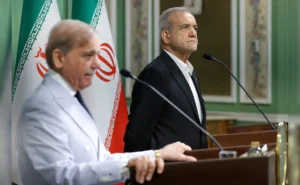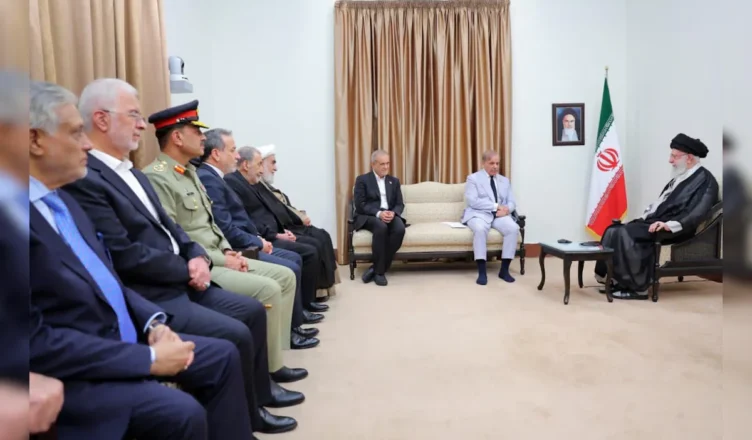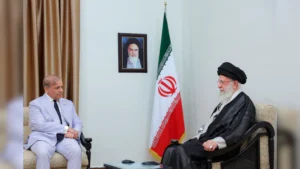 In the wake of heightened tensions between India and Pakistan following Operation Sindoor, Pakistan has sought to garner support from Iran by raising concerns about India’s treatment of Muslims. Iran’s Supreme Leader, Ayatollah Ali Khamenei, responded with measured remarks emphasizing Muslim unity but refrained from directly addressing the India-Pakistan conflict.
In the wake of heightened tensions between India and Pakistan following Operation Sindoor, Pakistan has sought to garner support from Iran by raising concerns about India’s treatment of Muslims. Iran’s Supreme Leader, Ayatollah Ali Khamenei, responded with measured remarks emphasizing Muslim unity but refrained from directly addressing the India-Pakistan conflict.
Iran’s Position: Emphasis on Muslim Solidarity
On May 26, 2025, Ayatollah Khamenei called for greater unity among Muslim nations, urging collaboration with Pakistan to oppose what he described as the “Zionist regime’s crimes” in Gaza. While highlighting the importance of Muslim solidarity in confronting aggression, he did not directly comment on the India-Pakistan conflict. (The Times of India)
In a previous instance, on September 16, 2024, Khamenei included India among countries where Muslims are suffering, alongside Myanmar and Gaza. He stated, “We cannot consider ourselves to be Muslims if we are oblivious to the suffering that a Muslim is enduring in Myanmar, Gaza, India, or any other place.” (The Hindu, ThePrint)
India’s Response: Firm Rejection of External Commentary
India’s Ministry of External Affairs (MEA) strongly deplored Khamenei’s remarks regarding minorities in India, labeling them as “misinformed and unacceptable.” The MEA emphasized that countries commenting on India’s internal matters should examine their own records before making observations about others. (The Hindu)
Pakistan’s Reaction: Appreciation of Iran’s Support
Pakistan’s leadership expressed gratitude towards Ayatollah Khamenei for his statements. President Arif Alvi and Prime Minister Imran Khan thanked the Supreme Leader for highlighting the plight of Muslims in India, viewing it as a call for a unified stance against perceived oppression. (IRNA English)
While Iran has historically maintained a balanced approach between India and Pakistan, its recent comments have introduced strains in its relationship with India. India, valuing its strategic and economic ties with Iran, especially concerning the Chabahar port project, has expressed concerns over Iran’s public statements. (Al Jazeera)
Conversely, Pakistan views Iran’s remarks as validation of its stance on India’s treatment of Muslims, potentially strengthening bilateral ties between Tehran and Islamabad.
India has consistently maintained that its disputes with Pakistan, particularly concerning Jammu and Kashmir, are to be resolved bilaterally without external mediation. This position is rooted in the 1972 Simla Agreement, wherein both nations agreed to address their differences through direct negotiations. (Wikipedia)
External Affairs Minister S. Jaishankar recently emphasized that the Kashmir issue is largely settled, with the remaining concern being the return of Pakistan-occupied Kashmir (PoK) to India. He described PoK as a “stolen part” under illegal occupation, underscoring India’s stance that the region’s reintegration is essential for complete resolution. (ABP Live)
India has also dismissed suggestions of third-party involvement in its bilateral matters with Pakistan. For instance, when questioned about the United States’ role in the recent India-Pakistan ceasefire, Minister Jaishankar clarified that the agreement resulted from direct communication between the two nations’ military commanders, not external mediation. (The Hindu, The Economic Times)
This steadfast approach reflects India’s broader policy of handling regional issues independently, reinforcing its commitment to sovereignty and direct diplomacy in resolving conflicts with Pakistan.(The Economic Times)
Pakistan’s efforts to involve Iran in its dispute with India have elicited a nuanced response from Ayatollah Khamenei, focusing on broader Muslim unity rather than direct intervention. India’s firm rebuttal underscores its sensitivity to external commentary on its internal affairs, highlighting the delicate balance Iran must maintain in its diplomatic engagements with both nations.
India has maintained a balanced and principled stance on the ongoing Israel-Hamas conflict, advocating for a peaceful resolution through dialogue and diplomacy. The Indian government has consistently condemned the October 7, 2023, terrorist attacks by Hamas on Israel, emphasizing its zero-tolerance policy towards terrorism. Simultaneously, India has expressed deep concern over the escalating humanitarian crisis in Gaza, calling for de-escalation and strict adherence to international humanitarian law. (mint, ThePrint)
In line with its longstanding support for a two-state solution, India has reiterated its commitment to the establishment of a sovereign, independent, and viable State of Palestine, coexisting peacefully with Israel within secure and recognized borders. To alleviate the suffering in Gaza, India has dispatched 70 tonnes of humanitarian aid, including 16.5 tonnes of medicines and medical supplies, and contributed $5 million to the United Nations Relief and Works Agency for Palestine Refugees (UNRWA). (India Today, DD News)
India’s nuanced approach reflects its strategic interests and relationships in the region. While maintaining strong ties with Israel, India also values its historical and people-to-people connections with Palestine. This balanced diplomacy is evident in India’s abstention from a UN General Assembly resolution calling for a ceasefire, citing the absence of explicit condemnation of terrorism in the resolution’s text. (India Today, The Times of India)
Meanwhile, the Gaza conflict has fostered closer cooperation between Pakistan and Iran. Iran’s Supreme Leader, Ayatollah Ali Khamenei, has called for unity among Muslim nations, urging Pakistan to collaborate with Iran in opposing Israeli actions in Gaza. This alliance emerges amid ongoing tensions between Iran and the United States over Tehran’s nuclear program, a development that India is closely monitoring given its strategic partnership with the U.S.(The Times of India)
India’s measured response underscores its commitment to a peaceful resolution of the Israel-Palestine conflict, balancing its diplomatic relationships while advocating for humanitarian considerations and international law.
Following India’s Operation Sindoor and the subsequent Indo-Pak ceasefire, Indian citizens have expressed strong disapproval towards Turkey and Azerbaijan due to their public support for Pakistan. This sentiment has manifested in widespread economic boycotts, travel cancellations, and social media campaigns, reflecting a collective stance prioritizing national interest over international engagements.
Diplomatic Measures
The Indian Ministry of External Affairs (MEA) issued a clear message to Turkey, emphasizing that international relations should be built on mutual sensitivities and respect for core concerns, particularly regarding national security and counter-terrorism. India urged Turkey to press Pakistan to cease its support for cross-border terrorism and dismantle terror infrastructure within its borders.
Public Sentiment and Actions
1. Economic Boycotts
- Trade and Retail: In Prayagraj, traders initiated a boycott of Turkish products, affecting an annual trade worth over ₹700 crore. This movement has expanded to sectors like vegetables, marble, jewellery, and dry fruits.
- Marble Industry: Udaipur’s marble industry, one of Asia’s largest, suspended ₹3,000 crore worth of marble imports from Turkey in protest against Turkey’s support for Pakistan. Approximately 70% of India’s annual marble imports come from Turkey.
- Jewellery Sector: Jewellers in Kolkata and other cities have decided to boycott Turkish jewellery products, including finished items and components. The Swarna Shilpa Bachao Committee, representing about 30,000 jewellers in Bengal, emphasized prioritizing national pride over foreign profit. (The Times of India)
- Trade Suspension Calls: The Federation of Jharkhand Chamber of Commerce and Industry (FJCCI) called for the suspension of trade with Turkey and Azerbaijan, reflecting growing nationalistic sentiment.
2. Travel and Tourism
- Trip Cancellations: Indian citizens, particularly in Nagpur, are increasingly cancelling trips to Turkey and Azerbaijan. Travel agencies report a wave of cancellations to both destinations, which had been popular alternatives to European vacations. (The Times of India)
- Travel Agency Actions: Major Indian travel platforms, including EaseMyTrip, PickYourTrail, and Cox & Kings, have suspended all hotel and flight bookings to Turkey and Azerbaijan. This decision aligns with national sentiment and concerns over safety and diplomatic implications. (Tourism India Online)
- Alternative Destinations: Social media users and travel agencies are encouraging Indian tourists to choose alternative destinations like Armenia and Greece, stressing national pride and dignity. (Tourism India Online)
- Event Cancellations: Affluent Indian families and NRIs are increasingly avoiding Turkey and Azerbaijan as venues for weddings and corporate events, leading to a decline in such bookings. This shift underscores the economic consequences that diplomatic relationships and national sentiments can have on the hospitality and tourism sectors of these countries.
3. Social Media Campaigns
- Hashtag Movements: Campaigns like #BoycottTurkey and #BoycottBaku have gained traction, with users urging fellow citizens to avoid supporting nations perceived as adversaries.(Tourism India Online)
- Influencer Opinions: Prominent voices on social media have advocated for redirecting tourism and trade towards countries that align more closely with India’s national interests. (Business Today)
4. Impact on Migration Routes
Amid escalating diplomatic tensions, around 500 Indians attempting illegal migration to the US are stranded in Istanbul. Istanbul, once a key stopover for human smuggling operations, has become difficult terrain due to disruptions in flights and the collapse of local support systems. The shutdown of these operations has left many individuals isolated in Turkey with no viable means to continue their journey or return home.
Economic Impact on Turkey and Azerbaijan
- Tourism Decline: In 2024, approximately 330,000 Indians visited Turkey and 240,000 visited Azerbaijan. Following the boycott calls, there has been a significant drop in bookings, with some travel agencies reporting a 60% decrease. (Tourism India Online, Wikipedia)
- Revenue Loss: The decline in Indian tourists is expected to impact the tourism revenue of both countries, which heavily rely on the sector for economic stability.
The collective actions of Indian citizens, businesses, and travel agencies underscore a shift towards consumer activism influenced by geopolitical considerations. This trend reflects a growing awareness and willingness among the populace to align personal and commercial choices with national interests.


